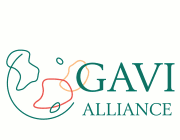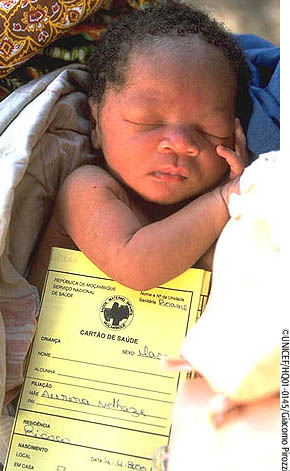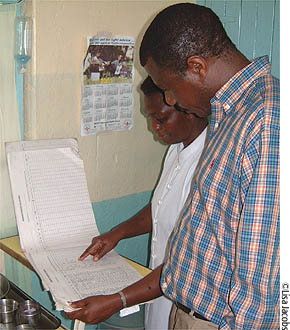 |
|
|
Immunization Focus - the GAVI quarterly |
|||||
|
NEWS - March 2002 En Français Board accepts ‘reward’ approach to funding must be postponed
THE ALLIANCE is to revise its plan to award performance-based grants to countries for increasing the number of children they immunize. The changes, agreed this month by the GAVI Board, are intended to make the grants system more practical and realistic and will give countries more time to strengthen their reporting of immunization data, without abandoning the principle of “rewarding” improvement. The immediate consequence is that, instead of being assessed for their first “reward” payment in their third year, countries will have an extra year of investment support, regardless of performance. The reward payment will kick in in the fourth year. For the first group of 16 countries approved for support for their immunization services in 2000, the first reward payments will be made in 2003 rather than 2002. Although some may see the decision as a setback for the Alliance’s way of working, others are simply pragmatic. “The revised approach is the most practical and equitable option,” says Michel Zaffran of WHO, a member of the GAVI Working Group. “We are keeping the original principles – giving countries an opportunity to define weaknesses and encouraging their efforts to improve immunization coverage and reporting systems. But we had to take account of reality.” Back in 2000, GAVI agreed that countries should be rewarded with “shares” for increasing the number of children immunized each year with three doses of DTP (DTP3) chosen as a measure of coverage. For example, if a country increased the number of children receiving DTP3 from 100,000 to 120,000 it would be awarded 20,000 “shares”. To discourage over-reporting, a data quality audit (DQA) was developed (see Immunization Focus, June 2001 and October 2001 ). External auditors were to check that the number of reported immunizations tallied with the numbers actually recorded.
But field tests of the DQA last year in eight countries found “significant weaknesses” in the data reporting systems of seven. A report for the Board by the GAVI Task Force on Country Coordination concluded that it was too soon to introduce performance based funding. “Most countries... will initially be unable to demonstrate valid reported DTP3 data,” the report said. While the original idea was that the amount awarded to each country would be adjusted to match the verified percentage of children receiving DTP3, the report concludes that this would be unworkable. No practical audit method would be able to check figures with the precision required to adjust funding in this way, the report says. Another serious problem with the audit is its cost – at $60,000 per country, it is not much less than the awards to some countries. The task force recommended changes in the way performance is assessed. This year, the DQA should be used in all countries, but only to gauge whether the reporting system is broadly "reliable" or "unreliable". Reliable systems will be defined as those in which 80% or more of reported immunizations can be verified by the auditors. All countries, whether their systems are "reliable" or "unreliable", will receive the extra investment payment this year. Next year, those countries whose systems are judged reliable will receive awards if their reported coverage increases, with figures endorsed by the country’s interagency coordinating committee (ICC). Those with unreliable systems will in principle have their rewards deferred until they have improved their reporting systems. They could also choose to demonstrate, through a coverage survey, that they have achieved their target. But, says Zaffran, the use of coverage surveys will be limited and will follow strict criteria. In the longer term, GAVI partners are to investigate using other indicators besides DTP3 to assess the overall "health" of the immunization system.
Since GAVI first proposed it, the idea of basing grants on performance has attracted the interest of other players in international development, most recently the Global Fund to Fight AIDS, Tuberculosis and Malaria. But for the model to work, countries need to have clear and robust indicators for measuring performance, as well as the capacity to collect the data. "One of the lessons we have learnt is that it is more complicated than one might think to set up a very simple model where you link disbursements to results," says Anders Nordstrom, interim executive director for the Global Fund, who is seconded from his post as head of the health division at the Swedish development ministry, SIDA. Nordstrom is confident that performance-based grants will remain central to future funding methods. But countries need long-term support to develop their own capacity for keeping clear health records to make this possible. Another lesson, he says, is for the donor community. "We have to change our own behaviour, too," he says. For example, donors should agree a small set of simple indicators rather than require countries to provide multiple sets of data. Phyllida Brown The Task Force report will be posted with all Board documents at www.vaccinealliance.org Immunization Focus March 2002 - Contents |
|||||
|
|
|
Copyright © GAVI |


